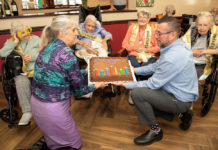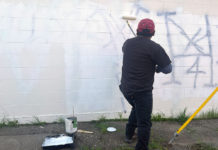Like a lot of people who live in west county, sisters Rochelle and Jillian Roberts drive past the homeless encampment along the Joe Rodota Trail and Highway 12 on a regular basis.
“I go running at Howarth Park all the time,” Rochelle said. “So I drive past it, and in the back of your head, you always think, like, what’s going on there? How can we help? But then you’re way too nervous to do anything.”
For Rochelle, that’s as far as it went until the Kincade Fire happened. The two sisters and their extended family of nine ended up temporarily homeless during the evacuation. They stayed in a friend’s already over-crowded home, then got a large cabin at a KOA campground, which cost more than they expected.
It gave Rochelle an inkling of what it might feel like to be homeless on a more permanent basis.
“It sparked me,” she said. “Last Sunday I was driving by to go take a run, and I just looked over, and I’m like, I need to do something. We need to do something.”
Rochelle talked to her sister Jillian and her friend Heather, who used to be homeless and is a recovering addict.
“So we were like, ‘Let’s just get some pizza’ for them,” Rochelle said.
They bought 10 Costco pizzas and some bottled water.
“Then we loaded up the kids wagon, and we just went down there,” Rochelle said. “And, yes, we were a little nervous.”
“But when we got down there, everybody was so nice,” Jillian said. “Our mother always taught us that it doesn’t matter if it’s a bum on the street or a CEO, you always treat everybody the same. Everybody gets treated equally.”
They pulled their wagon down the trail, offering slices of pizza to anyone who wanted some. They walked the whole length of the trail, chatting with people they met.
Driving home that day, they talked about what more they could do.
“We don’t have a lot of money,” Jillian said — certainly, not enough to make a difference in the lives of the hundreds of homeless people who line the trail.
Both sisters work for their father’s trucking company, Rio Dog Trucking. Rochelle lives in a trailer on her parent’s property because, after she lost her four-bedroom rental home to the Tubbs Fire (her landlords lost their house in the fire and so had to move into their rental), she couldn’t find a place to live that she could afford.
The sisters decided that what they could do — in addition to making a weekly Wednesday food run to the encampment — is gather donations from people and distribute them among the homeless the same way they distributed the pizza.
Last week, they started a Facebook group called Sonoma County Acts of Kindness and were shocked to discover that within three days the group had 300 members eager to donate all sorts of things — clothing, food, tarps, tents. When they put out a call for adult diapers for some of the elderly people they met along the trail and for menstrual products for the women, they were overwhelmed by the response.
The sisters said they’ve been shocked by some of the things they have learned on their visits to the encampment.
For instance, people driving by on Highway 12 yell at the homeless — all day.
“They were being really rude and yelling and screaming things like ‘Losers, get a job,’” Rochelle said.
“You should see the faces of the people along the trail when that happens,” Jillian said, her face stricken with the memory of the pain she witnessed.
“Plus people honk their horns at them — all times of day and night,” Rochelle said, likening it to a kind of psychological torture.
Adrienne Lauby of the Homeless Action confirmed that this harassment is a real problem.
“This is the third or fourth encampment I’ve worked with,” Lauby said. “And it’s also the most visible. Because of that, there’s been a huge outpouring of support for the people living along the trail from a wider group of people, as well as a huge increase in harassment.”
Rochelle said someone has recently ramped up this harassment of the homeless by hiring large trucks to by dump piles of ripe-smelling manure along the trail, right next to people’s tents, which she said is a health hazard as well as an intimidation measure.
Rochelle was there when it happened. One of the workers told Rochelle it was for planter boxes — though there were no boxes in sight. She thinks the real reason is to discourage people from camping there.
Rochelle said doing this work has made her step out of her comfort zone.
“I’m not a people person. I am a complete introvert. This is not me. I’m not a leader,” she said, but she felt she had to do something.
Sometime it’s hard to take, she warns.
“If you go there, you’ll see things that will shock you,” she said.
“There’s some people who are really lost out there or mentally ill, you do see that,” Jillian said.
Both sisters said the ravages of addiction are particularly clear along the trail. Though some might find this hard to take, they said they’re familiar with it because addiction has touched their family.
“We’ve been around addiction our whole life,” Rochelle said, noting that a close family member is a recovering heroin addict. “We’ve seen how bad it can get so it’s a lifestyle that I’m very familiar with. It’s not shocking to me, sadly.”
“We know the trickle-down effect it can have,” Jillian said, “and we know how one bad turn can really put you in a position like that.”
It’s one of the reasons they don’t give out cash along the trail.
“I’m not blind. It’s apparent that there’s drug and alcohol use going on there, and you see paraphernalia,” Rochelle said.
She said she’s happy to take donations of cash, but will use it to buy things the homeless need. Rochelle also said that if people want to donate things — warm clothing, tents or tarps, anything — she’d be happy to come pick them up and deliver them to the people along the trail.
Rochelle also encourages people to take donations down there themselves and see for themselves what’s going on.
“I really think it’s important for people to go down there and just not have an opinion, but just walk down there and be like ‘Hey, how you doing?’ Everyone’s so nice. I mean it. I haven’t met one person that rubbed me the wrong way at all or made me feel unsafe or uncomfortable.”
No matter what caused the people along the trail to fall into homelessness — addiction, mental illness, family or financial troubles — they all share one thing, Jillian said: “They’re still human beings.”
“There has to be some sort of humanity and compassion for these people,” she said. “What if you fell on hard times? You’d still be a human being.”
At the same time, they understand why the people who live in the neighborhood along the trail are up in arms about the encampment.
“Would I want to live next to a homeless encampment? No,” Rochelle said.
Both sisters hope the county will come up with a longer-term solution for the homelessness along the trail — at first, just a better place for the homeless to camp, with bathrooms and services, and then actual housing, with wraparound services to deal with issues like addiction and mental illness, that drive people into homelessness in the first place.
Until that time, the Roberts sisters said they’ll continue their visits to the encampment along the Joe Rodota trail, dispensing food, clothing and anything else the people who live there need.
If you’d like to help, join their Facebook page at Sonoma County Acts of Kindness.
52.5
F
Healdsburg
March 16, 2025








